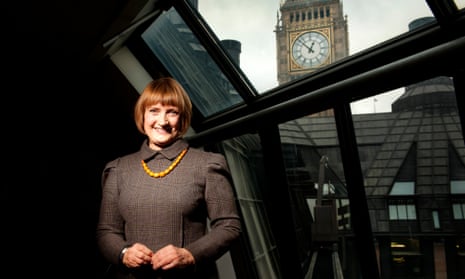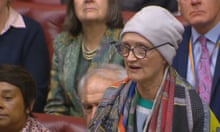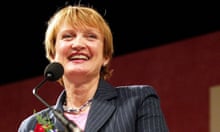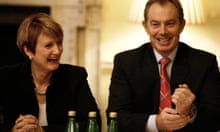Until the revelation of her brain tumour last September, Tessa Jowell, Lady Jowell, the former secretary of state for culture, media and sport, who has died aged 70, was best known outside Westminster as the minister for the Olympics in the run-up to the hugely successful London games in 2012. It was directly as a result of her enthusiasm and personal pressure on the then prime minister, Tony Blair, that the UK first mounted its bid and then subsequently won the competition to stage the event. As an MP in the House of Commons, Jowell was best known as the unfailing cheerleader for Blair’s leadership of New Labour: “The ultimate sensible loyalist”, as he described her in his memoirs.
After the unexpected death of John Smith in May 1994, Jowell was one of the first Labour MPs to assert Blair’s claim to inherit the Labour leadership. Her steadfast support thereafter was rewarded with her uninterrupted tenure of a seat on the party’s frontbench for the next 18 years. “She is a great person, Tessa, just a gem,” wrote Blair. “She represents the best of political loyalty, which at its best isn’t blind, but thoroughly considered.” She nonetheless spoke her mind to the prime minister, notably over the Olympics. She upbraided him for having doubts about making a bid: “Of course we may not win,” she told him, “but at least we will have had the courage to try.” She was also one of those close to him who persuaded him not to stand down in 2004. Although she later tried to deny it, Jowell did once say of Blair in an interview: “I would jump in front of a bus to save him.”
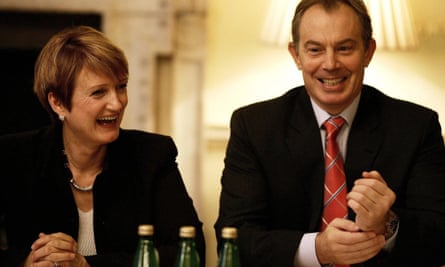
Jowell had been elected to the Commons as MP for Dulwich (later Dulwich and West Norwood), in 1992, only two years before Blair’s election as leader, but she had previously acquired 15 years of political expertise as a Labour councillor. She had also made a number of important social and political connections, moving as she did in a circle of increasingly influential Labour supporters, many of whom shared her belief in the need for a party shakeup. It was this emphasis on a new-look, modern Labour party that coalesced around Blair’s bid for the leadership and Jowell, who knew how to handle the media as well as the woman in the street, was in the vanguard.
Blair recognised both her competence and the useful potential of her likeable personality. She exuded cheerfulness and gave even those she had only just met the sense of being one of her old friends. In consequence, in the course of her career she was handed some of the most testing social policy briefs in government, including dealing with broadcasting policy, licensing hours, gambling laws, equality legislation, tobacco advertising, the nation’s diet and the Queen’s golden jubilee.
Her reputation as a “people politician” with the common touch led to her being given ministerial responsibility for helping the families of British victims of the 2001 attacks on the New York World Trade Center and in 2005 for those caught up in the July terrorist attacks on the London transport system.
Her apparent straightforwardness – which disguised a sharp respect for political pragmatism – her genuine commitment to social justice and, above all, her demonstrated reliability to stick to the New Labour message in all circumstances, guaranteed her swift early promotion. She became known in the media, partly because of her government responsibilities for a range of domestic issues, as New Labour’s very own nanny. Unusually, in 1996 she had been confirmed as an adult into the Church of England. Peter Mandelson is godfather to one of her children.
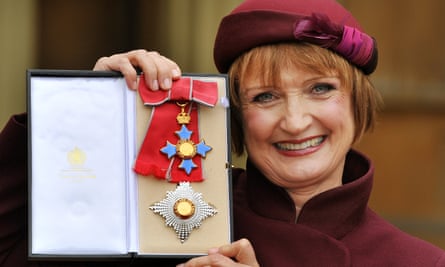
She did not escape controversy, but it didn’t happen because of her own lack of political skill. In the first instance she was embroiled in an early scandal of Blair’s new administration in 1997 when, as minister of state with responsibility for public health, she had to justify seeking to exempt Formula One motor racing from the proposed ban on tobacco advertising, having previously described herself as the “scourge” of the tobacco industry. It then emerged that the Formula One boss, Bernie Ecclestone, had made a donation of £1m to the Labour party’s recent election campaign and that Jowell’s husband, David Mills, had business links with one of the racing teams. There was no impropriety in the family connection, but Blair had to apologise for the government’s mishandling of the affair and promised to return the political donation from Ecclestone.
More personally embarrassing was the later revelation that her husband, a millionaire tax lawyer, had accepted a gift of £350,000 from the disgraced former Italian prime minister, Silvio Berlusconi, in exchange for allegedly giving false testimony in two trials. The couple separated in 2006, a move suspected by some as designed to save Jowell’s cabinet job. Mills was given a four-and-a-half-year jail sentence by the Italian courts in 2009, against which he appealed, but the sentence was overturned for technical reasons in 2010. The couple were reconciled in 2012.
Tessa was the oldest of three children of Kenneth Palmer, a doctor, and his wife, Rosemary Douglas, a radiologist and an artist. Tessa was born in London but the family moved to Aberdeen when she was five and she was educated at the city’s St Margaret’s school for girls and the University of Aberdeen, where she studied general arts, sociology and psychology. She then did a further degree in social administration at Edinburgh University before moving to London, working as a childcare officer in Lambeth and then qualifying as a psychiatric social worker at Goldsmiths College, University of London.
She worked at the Maudsley hospital from 1972 to 1974, then switched to the voluntary sector as assistant director of the mental health charity Mind until 1986. For the next four years she was director of a community care special action project in Birmingham. From 1990 until her election to parliament she worked for the Joseph Rowntree Foundation and was a senior visiting fellow at the health and social care charity the King’s Fund.
She had joined the Labour party when she was 22, in 1969, jokingly attributing her interest in politics to her enthusiasm for the Stanley Kubrick film Spartacus. In 1971, she was elected to Camden council in London and within two years was chairing the social services committee. Later in her council career, from 1984 to 1986, she chaired the social services committee of the powerful Association of Metropolitan Authorities.
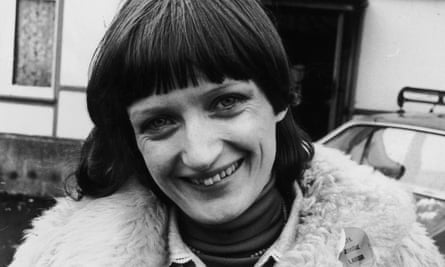
In 1970, she had married the social scientist Roger Jowell, who was also a Camden councillor, but she then met and fell in love with Mills. They married in 1979.
Tessa Jowell was picked as the Labour candidate in Ilford North to defend the party’s very narrow majority in what proved to be a key byelection in 1978, caused by the death of the sitting MP. It was a bitterly contested election, fought in difficult circumstances and the revelation of her domestic circumstances in the course of the campaign was an added and unwelcome distraction. Vivian Bendall won the seat for the Conservatives and the following year increased his majority over Jowell in the general election. During the 1980s, Jowell failed to secure selection as the Labour candidate for Bermondsey and for Hampstead and Highgate, but was selected for Dulwich in 1990.
Jowell’s professional life had provided her with a considerable record of hands-on experience, which she would later bring to her government jobs at the Department of Health from 1997 to 1999 and, from 1999 to 2001, as minister of state with responsibility for women and as minister for employment, welfare to work and equal opportunities.
She introduced health targets, maternity and paternity leave and the Sure Start initiative for improved childcare. “I moved from social care to government because it’s only in government that you can provide the big solutions,” she explained once. She was promoted to the cabinet as culture secretary in 2001, with the Olympics added as a special responsibility in 2005. Her period in the department was marked by much public debate about the future of television, about digital broadcasting and the structure and financing of the BBC. She oversaw the establishment of the media regulator Ofcom. During the phone-hacking scandal, which led to the closure of the News of the World, she revealed that her own phone had been hacked 28 times in early 2006.
When Gordon Brown succeeded Blair as prime minister in 2007, he kept Jowell on as Olympics minister, but she was demoted from the cabinet. She was appointed minister of state and given the title paymaster general, but the trajectory of her career path had changed. In Labour’s last year in office before the 2010 election she was given the job of minister for London and she retained her responsibility for both the Olympics and for London until 2012.
She stood down as an MP in the 2015 general election in order to campaign to win selection as Labour’s candidate for the post of London Mayor, a post for which she fought with characteristic energy and for which she was early favourite. She lost to Sadiq Khan, then MP for Tooting, who proposed a more radical agenda and comfortably won the selection in all three categories of the party’s electoral college.
Jowell was made a member of the Privy Council in 1998 and a dame in 2012. She joined the House of Lords in 2015 and took up a number of academic appointments, including that of a senior fellow at the Institute of Government and a further senior fellowship at the School of Public Health at Harvard University.
Jowell announced she had brain cancer last September and later vowed to find ways to make “better, longer lives for people with cancer”.
In January, she received a standing ovation – breaking parliamentary protocol – in the House of Lords after giving a moving speech about her cancer in which she urged peers to support an international initiative to share resources, research and new treatments.
Jowell’s speech led to a meeting in February with ministers, cancer campaigners and charities where some of her objectives such as measuring improvements in the quality of life lived with cancer were agreed.
And she was hailed as an inspiration during a debate in parliament, when she came to the House of Commons to meet the health secretary, Jeremy Hunt, and his Labour shadow, Jon Ashworth, in her campaign for better support and access and more research to clinical trials for brain cancer patients.
She is survived by her husband, their two children, Jessie and Matthew, and three step-daughters.
Tessa Jane Helen Douglas Jowell, Lady Jowell, politician, born 17 September 1947; died 12 May 2018
